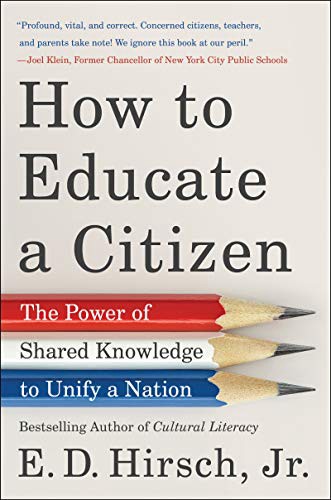
Earlier this year, E.D. Hirsch, Jr. published his farewell manifesto How to Educate a Citizen: The Power of Shared Knowledge to Unify a Nation (HarperCollins 2020). Hirsch, who is now 92, opens his final message to the American school system with the note that he is writing, not from the perspective of an educator concerned about the quality of our children’s education, but “as An American concerned about our survival as a high-achieving, fair, and literate society.”
That may be for the best, as the book is certain to upset an American school of teaching that has shifted toward a child-centered approach to teaching, rather than a knowledge-based approach to teaching. How to Educate a Citizen is a direct attack on the former, using scientific data, research, and dozens of interviews with educators to offer a scathing critique of how our schools teach, and at the institutions that train teachers.
Hirsch does not mince words, taking direct aim at education reform that, in his view, has abandoned “teaching knowledge coherently” in favor of teaching critical thinking skills — and in doing so “diminishing our national unity and our basic competence.”
“History, geography science, civics, and other essential knowledge that is the mark of an educated citizen have been dumbed down by vacuous learning ‘techniques’ and ‘values-based’ curricula,” Hirsch writes. “The results have been devastating.”
While the book argues that in order to rebuild the school as the center for teaching civics, patriotism, and citizenship, it is not an argument against diversifying the narrative of our history. Rather, it shows the pitfalls of what happens when the narratives change differently among different schools: We’re left with a nation whose citizens speak different languages, and therefore lack connection to one another.
This has been especially devastating to disadvantaged students, he writes. “To be a disadvantaged child is to lack the modes of speech, the vocabulary, and the shared knowledge of the national print culture…. The only way the ‘construct it for yourself’ mode of teaching can work for a child is if she has adequate prior background knowledge to deduce the right inferences.”
At its heart, Hirsch’s farewell is a final word of advice to the American school system: If we want to survive as a nation, we can teach students at their own pace and skill level, and personalize learning for all students, so long as they are all working off of the same knowledge base. And this is especially true of civics, Hirsch writes, which he believes should be renamed “history and civics.”
How to Educate a Citizen is sure to ruffle some feathers, but it’s an essential read for 2021 — and food for thought as we re-imagine civics (and history).


 See All
See All